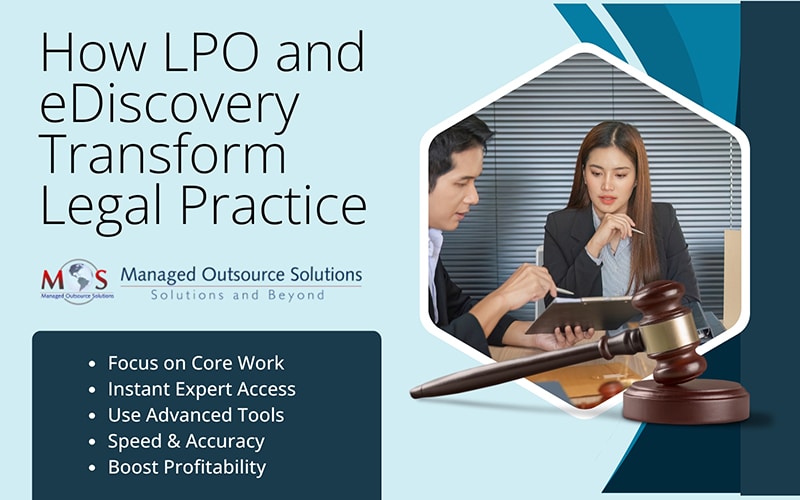Efficiency, cost-effectiveness, and access to specialized expertise are essential elements in the legal industry. This is where outsourced legal support for eDiscovery comes into play. Legal Process Outsourcing (LPO) allows law firms and corporations to delegate time-intensive legal tasks to external service providers, often located overseas. Once considered risky due to concerns about confidentiality and quality, LPO has matured into a trusted global practice embraced by both small and large firms. Today, it is not only a way to cut costs but also a strategic approach to handle growing workloads while maintaining high-quality legal services.
One of the key areas where LPO has gained immense importance is eDiscovery, the electronic process of collecting, reviewing, and presenting digital evidence for litigation. With data volumes increasing daily, outsourcing eDiscovery has become a vital tool for modern legal practices.
Why Outsourced Legal Support for eDiscovery Is Essential
The global legal services industry continues to expand, with spending on outsourcing legal services reaching remarkable levels. According to recent market estimates by Future Market Insights, the global Legal Process Outsourcing (LPO) market is expected to reach USD 21.6 billion by 2025 and is projected to grow to USD 157.9 billion by 2035, expanding at a CAGR of 22.0% during the forecast period.
A major driver of this growth is the rising demand for cost-effective legal support, especially in regions such as the United States and Europe. Many firms are now outsourcing to countries like India, which has a large pool of English-speaking legal professionals trained in common law systems.
For law firms, outsourcing means not just savings but also efficiency, scalability, and access to experts who can handle tasks such as legal research, drafting, legal support services, compliance support, and increasingly, eDiscovery. By understanding the benefits of legal process outsourcing for law firms, organizations can maximize productivity while minimizing operational burdens.
Understanding eDiscovery in Today’s Digital Legal Landscape
As organizations store more information digitally, legal disputes increasingly rely on electronically stored information (ESI). This includes emails, text messages, spreadsheets, databases, calendars, images, videos, and even metadata such as timestamps or author names.
The transition from traditional paper discovery to eDiscovery process has transformed the legal process, making evidence collection both more efficient and more complex. The challenge lies in managing massive volumes of data while ensuring accuracy, defensibility, and compliance with court requirements.
Since 2005, the Electronic Discovery Reference Model (EDRM) has guided the process, which typically includes:
- Information Governance – Establishing data management and security policies.
- Identification – Locating relevant digital documents for litigation.
- Preservation – Protecting identified data through legal holds and access restrictions.
- Collection – Gathering data using defensible, forensically sound techniques.
- Processing – Converting and filtering data into court-approved formats.
- Review – Assessing documents for relevance, privilege, and responsiveness.
- Analysis – Extracting insights to strengthen legal arguments.
- Production – Submitting evidence in the required format.
- Presentation – Using the collected evidence in trials or hearings.
By following these steps, law firms can streamline their litigation process and ensure that digital evidence is both admissible and defensible in court.
Why LPO and eDiscovery Go Hand in Hand
For many firms, legal research and eDiscovery are essential but not core functions. The primary focus should be on advising clients, building cases, and achieving favorable outcomes. By outsourcing eDiscovery and research, law firms can align resources more strategically while gaining access to expertise and advanced technology.
Here’s how LPO and eDiscovery work together to transform legal practice:
- Focus on Core Activities: Attorneys can prioritize client representation and case strategy while delegating research and eDiscovery tasks.
- Access Skilled Experts Instantly: Outsourcing partners employ trained legal professionals familiar with the latest tools and compliance requirements.
- Leverage Advanced Tools: Providers invest in cutting-edge eDiscovery platforms, ensuring secure handling and efficient processing of digital data.
- Increase Speed and Accuracy: Outsourced teams can quickly collect and analyze large data sets demonstrating how LPO improves efficiency in eDiscovery.
- Boost Profitability: By reducing overhead costs and optimizing workflows, outsourcing improves revenue and allows firms to serve more clients.
As data volumes grow, in-house teams cannot always manage the scale of discovery requirements without external help. By outsourcing these functions, law firms not only reduce costs but also enhance accuracy and compliance with strict legal standards.
Furthermore, with the rise of technologies like AI and machine learning, outsourced eDiscovery providers bring advanced solutions that many firms may not have the resources to implement internally. This makes outsourcing not just an option but for many firms, a necessity to remain competitive.
The rise of LPO has reshaped how the legal industry operates, offering a smarter, faster, and more economical way to manage complex legal tasks. In particular, the role of eDiscovery highlights how critical outsourcing has become in handling vast amounts of digital evidence. By utilizing legal process outsourcing services, law firms can streamline workflows, cut costs, and focus on their core mission: delivering exceptional legal representation. As technology continues to evolve, LPO will remain central to ensuring efficiency and competitiveness in the global legal market.





